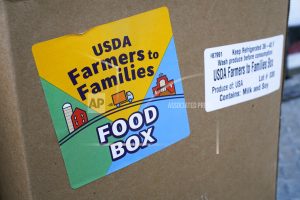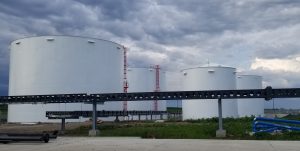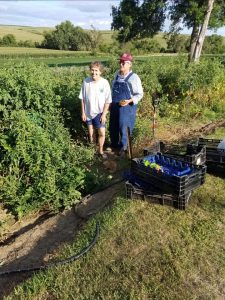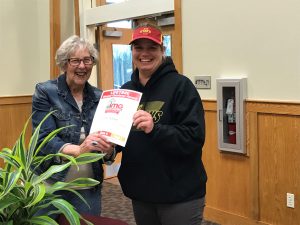CLICK HERE for the latest market quotes from the Iowa Agribusiness Network!
CLICK HERE for the latest market quotes from the Brownfield Ag News Network!
CLICK HERE for the latest market quotes from the Iowa Agribusiness Network!
CLICK HERE for the latest market quotes from the Brownfield Ag News Network!
Washington (AP) — The U.S. Senate voted 92-7 Tuesday to confirm Tom Vilsack as Agriculture secretary. The former Iowa governor spent eight years leading the same department for former President Barack Obama. In his testimony, Vilsack, 70, heavily endorsed boosting climate-friendly agricultural industries such as the creation of biofuels, saying “Agriculture is one of our first and best ways to get some wins in this climate area.” He faced minimal opposition throughout the confirmation process.
DES MOINES, Iowa (AP) — Agricultural groups and anti-hunger organizations are pushing the Biden administration to continue a program launched by President Donald Trump that spent $6 billion to prevent farmers from plowing under food and instead provide it to millions of Americans left reeling by the coronavirus pandemic. The U.S. Department of Agriculture began the Farmers to Families Food Box program in April 2020 after many people were shocked to see farmers destroy crops even as food banks were being overwhelmed by demand from people suddenly out of work.

A USDA Farmers to Families Food Box is seen at a Des Moines Area Religious Council mobile food pantry stop at the downtown bus station, Thursday, Feb. 18, 2021, in Des Moines, Iowa. Agricultural groups and anti-hunger organizations are pushing the Biden administration to continue the Farmers to Families Food Box program launched by President Donald Trump that spent $6 billion to prevent farmers from plowing under food and instead provide it to millions of Americans left reeling by the coronavirus pandemic. (AP Photo/Charlie Neibergall)
If the USDA extends the program, it will be a rare example of the new administration retaining rather than dismantling a Trump initiative.
DES MOINES, Iowa (AP) — A group of 24 scientists, economists, researchers and other past winners of the World Food Prize sent a letter to President Joe Biden asking him to focus on alleviating global hunger, poverty and malnutrition. The World Food Prize Foundation released the letter Tuesday that asks the president to take immediate action to directly address global hunger and food insecurity by playing a leadership role in the upcoming UN Food Systems Summit and expanding the USAID Feed the Future initiatives.
The letter says: “American leadership on getting food systems right will inspire and embolden others to join forces to end hunger, counter climate change, generate jobs, and promote responsible stewardship of the environment.”
DES MOINES, Iowa (AP) — The federal government announced Monday that it will support the ethanol industry in a lawsuit over biofuel waivers granted to oil refineries under President Donald Trump’s administration. The Environmental Protection Agency said it is reversing course and will support a January 2020 decision by the Denver-based 10th U.S. Circuit Court of Appeals in a lawsuit filed by the Renewable Fuels Association and farm groups.
 The lawsuit is headed to arguments before the U.S. Supreme Court this spring. The move by the EPA comes roughly a month after President Joe Biden took office.
The lawsuit is headed to arguments before the U.S. Supreme Court this spring. The move by the EPA comes roughly a month after President Joe Biden took office.

Ethanol tanks
Cass County Wellness Coordinator Brigham Hoegh reports, this Saturday, February 27th, Anita Town and Country will be hosting a USDA “Farmers to Families” Food Box distribution at the Anita Community Center, from 12:00 – 1:00 PM, or while supplies last. Anyone is welcome to visit the drive-through food box pick-up, and no documentation or proof of need is required. Boxes will be given away at no cost. People from surrounding towns and communities are welcome.
The USDA Farmers to Families Food Boxes are likely to contain fresh fruits and vegetables, dairy products, and meat.
Anita Town and Country Farmers to Families Food Box Giveaway, Details:
What: Drive-through food distribution.
Where: Anita Community Center (805 Main St, Anita, IA 50020)
When: Saturday, Feb. 27 12:00-1:00 PM (or as supplies last).
Who: Anyone is welcome! No documentation required. People from surrounding towns and
communities are welcome.
Cost: No cost!
(Radio Iowa) – Iowa’s largest manufacturing employer is reporting spectacular first-quarter earnings. Quad Cities-based Deere and Company says net income for the quarter more than doubled from a year ago to more than one-point-two billion dollars, including a 23-percent gain in net sales. Deere officials credit the “successful execution of a new operating strategy.”
In a news release, chairman and CEO John May says the results were aided by improving conditions in the farm and construction sectors. The full-year earnings for fiscal 2021 were also increased to a range of four-point-six to five-billion dollars.
(Radio Iowa) — Changes members of Congress made to the Paycheck Protection Program could mean bigger payments to Iowa farmers who’ve seen their operations hurt by the pandemic. Iowa Farmers Union president Aaron Lehman says those tweaks to the program were much-needed.
Lehman says, “Our folks out in the field have really struggled just to tighten their belts and make ends meet and the pandemic caused all sorts of trouble, up and down the line, for farmers and for people involved in all aspects of our food system.” Under recent P-P-P provisions, Lehman says that money won’t be taxed as income and won’t affect any deductions farmers may take.
Lehman says federal aid is critical for agriculture, especially since farmers and ranchers have a long road to economic recovery following the pandemic.
Farmers and small businesses can apply for P-P-P loans through their traditional lenders such as banks and farm credit institutions.
Cass County Master Gardener, Todd Turner, was honored by the Iowa Master Gardener Program as an Outstanding Master Gardener for the 2020 Year. Todd was one of 15 honorees statewide this year. The award is given to Master Gardeners who have invested more than 400 hours of volunteer time in a year.

Todd Turner and his wife pose in their garden in summer of 2020 (Photo submitted)
The Cass County Master Gardener group has members in many surrounding counties and Todd spent the majority of his volunteer hours working on food donation gardening and local food distribution events. He helped expand the LiveWell Montgomery County Giving Garden, and facilitated donations to 4 food pantries in Red Oak and 1 food pantry in Elliott. In addition to his home garden which is 7500 sq. ft., and the Giving Garden, he also helps with a produce garden at the Montgomery County Memorial Hospital. Excess produce from Todd’s garden was also donated to the Grow Another Row project and other pantries in Cass County. These donations amounted to 2500 lbs. of fresh produce in 2020. In addition to growing many varieties of vegetables, Todd also enjoys growing unusual varieties, often bringing them to meetings to quiz the members on what he has brought.
Todd is not the only Cass County Master Gardener to be honored by the state program in recent years. In 2016 LaVon Eblen was also recognized as an Outstanding Master Gardener for investing over 400 volunteer hours in the Master Gardener program for the year. In 2019 LaVon was also recognized for over 1000 total hours volunteered as a Master Gardener in Cass County with the Lifetime Service Award.

LaVon Eblen is awarded the Lifetime Master Gardener Award by Extension Director Kate Olson
In total, during the 2020 growing year, Cass County Master Gardeners volunteered over 1,000 hours of service. The Master Gardener Program, offered statewide by Iowa State University Extension and Outreach, trains volunteers to develop their knowledge and skills in horticulture. These volunteers then give back to their communities through gardening service and education. The goal of the Master Gardener program is to support horticulture education and community service. Local Master Gardeners provide many hours of volunteer service and gardening education within their local communities, including demonstration gardens, horticultural education, community grants and scholarship programs, and resources for problem solving in the garden. Education courses are available throughout Iowa on a regular basis. Applications for the Fall 2021 Program will open on March 1. For more information on the program, contact Cass County Extension Director Kate Olson, at 712-243-1132 or keolson@iastate.edu.